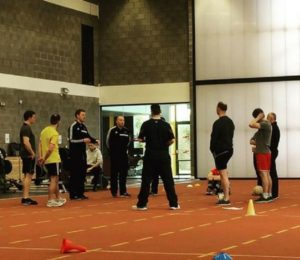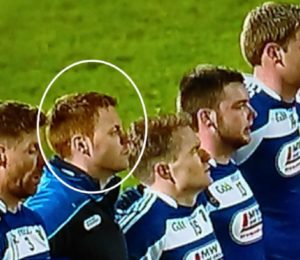Ahead of everyone looking to see what Mayo and Dublin will bring to the All Ireland Football Final, S&C coach and gym owner Noel Flynn has his say on the current state of Strength and Conditioning in GAA, the expectations around the role and how communication is key to a lasting legacy.
Noel has written in the past about ‘why’ he became a strength and conditioning coach, today he is going to write about some of the lessons he has learnt, the changes he would like to see and where he feels the future of the role of the strength and conditioning (S&C) coach should lie in the GAA and other sports.
The role of the S&C coach is certainly growing and it is something I am highly proud and glad that I went into but I do feel the title Strength and Conditioning Coach is getting abused or overused and added to the list of qualifications some coaches supposedly have very easily and therefore I can see why the S&C coach may not be trusted or used to the full potential not only in the GAA but in the whole sports and fitness industry.
But who is at fault? Maybe it is the coach for not communicating enough or maybe it is the GAA clubs and counties for not educating themselves enough? Whichever way, communication is key!!
It is my belief that it is not all about the sets and reps as many S&C coaches would pride themselves on but on the overall culture that is created in the team, club, county or even sport or health / fitness centre.

Noel Flynn
If we look at the All Blacks, their Legacy and what representing their jersey means to them, sets and reps are not going to mean as much to them as the application, the education, the pursuit of success, of hard work, of being the best they can be. This is why it is my belief that we need to look at the bigger picture.
What do I mean the bigger picture?
Let’s take a simple example of communication – there is no point in the S&C coach having planned a 6, 12, 18 week programme for the gym if it conflicts what is going on the pitch. There is serious evidence and research pointing to the need for rest and recovery, if you train hard, you must recover harder. So therefore as a coach I try to work around having harder sessions and lighter sessions, fun sessions (which should be integrated in some part into every session really) and serious sessions, harder weeks and lighter weeks. I like to give players an unload week every 4 or 5 weeks. This is harder done in reality and this is why I talk of the bigger picture and the culture of the sport and the communication involved.
What if you have dual players, what if you have players on multiple teams playing multiple sports, what if you have highly stressed players through work or college or from family and life situations?
You cannot prevent or plan for every situation and you would be wasting your time trying but what if you educated the players, the fellow coaches, the parents, the clubs, and the county officials! It keeps coming back to the bigger picture, communication and education.
Ask yourself if you have ever as a player, coach, parent or administrator being frustrated with fixtures, training schedules? If you are a player have you ever felt the want for rest but it’s not part of the culture? Maybe you feel it is all about hard work? But you see it is….it is all hard work, having the discipline to eat right, having the discipline to get adequate sleep to perform, and having the discipline to do the stretches and corrective exercises your S&C coach prescribed. The All Blacks have a great quote as part of their legacy – “Winners do extra!!”
For me it’s getting the ‘extra’ right. It’s funny I am an S&C coach therefore people expect that you want the players in the gym. If all was well, I would never have them in the gym, I would just let the players play their sport. When a kid joins the GAA they do so to play football or hurling, they do not do it for the love of the gym or the love of running.
However our kids and now adults are so poorly coordinated, lack balance and dexterity, have poor postures from their school and work environment, are so tight in some muscles and joints while so weak in others. How many kids do you see playing matches on their local greens, how many are playing on the roads, how many are running and jumping, how many are putting in extra time to skill development?
Can we say the same for adults? I think most people will agree that society is and has changed rapidly. There are so many factors that create a truly great

Setanta tutor Noel Flynn in the LIT SportsLab, Thurles
sports person! There is no point in being the most skilful player on the pitch if you are also the slowest and never have the time to execute the skills and vice versa, there is no point in being the fastest and waste every possession due to lack of skill. What about the player who always looks tired…..what can we do to help that player? For many players and coaches there is a belief that they are unfit and they need to train harder….but what if they had participated in the same amount of training sessions as everyone else? Did anyone look to see what the players nutrition was like, what their sleep was like, or simply ask them how is life and what is going on outside of training with work or family?
I can relate to these as both a player and a coach. As a player I was at my least fit when I should have been in my prime. I thought my diet was spot on but I was always sneezing and having allergic reactions, on the pitch I was suffering serious bouts of cramp and felt I was unfit but I was working as hard as I could….others felt I wasn’t working hard enough…..but my body was in pain….and so was my mind. There was 2 things going on – I was dairy intolerant and took a long time to figure that one out – while my Dad was sick and had cancer – again it took years to diagnose the cancer – which in time resulted in his death.
I have seen the same as a coach –brilliant players not performing, feeling tired, feeling like they are unfit and trying to train more to catch up – but had also lost their jobs, were unsure how long they would be out of work, where they would be living, where they would get their next job – and yet on the sports field they are considered out of shape.
There are many things I wanted to cover in this article, for example:
- Periodisation
- Demands of the sports
- Programme design
- Nutrition
- Mindset

S&C Coach, Noel Flynn
But for now they are not as important as thinking about the bigger picture, the legacy you want to have as a player or a coach, as a club or a county – as I said it is not all about the sets and reps but the education, communication and the culture and long term strategies you put in place in order to be successful in the sport. Remember if you too are a coach – it is not about you it is about the players. If you are a player it is not about you it is about the club, the county and your team mates – if you are an administrator it is not all about balancing the books – it is about a long term culture of education, communication and a strategy for success. If you do not think like this maybe you are not having the impact you could be having. I know I personally am striving to be better as a person first and foremost (bigger picture) and then improve on other facets (sets and reps).
One thing that is becoming clear is that Strength & Conditioning is needed to be successful in some sports more than others. A soccer player can get to the absolute highest level without Strength & Conditioning (not all but it is possible), a hurler can get to the top based on skills alone but will need to be seriously skilful and need a base level of S&C. A Gaelic Footballer will need a high level of S&C to get to the top, skill is no longer enough as the game has become so fast paced and powerful that a weak player will be blown out of it, while in Rugby you can get to the absolute highest level because of your strength and power and physical specimens are getting to the top yet may not have being the most skilful player on their schools team.


Leave A Comment